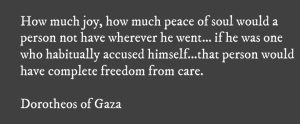I’m told that my book, How to Be a Sinner, is appearing sometime in February.
What’s it about? It starts with the observation that a lot of what we read and pray in the context of the Church has us calling ourselves “sinners.” Somehow, I think we can’t let that go unexamined. Like many things we repeat in prayer, it would be easier to just let it pass. But I think there’s something to this language that needs examining.
In academese, we sometimes say that this or that concept “needs to be problematized.” Meaning that we have to pick it apart a bit, see what could be problematic in it, in order to strengthen our understanding of it.
That’s what I’m doing with the “sinner identity.” Because in fact there are all kinds of ways to misunderstand it or misuse it.
- One way would be to equate it with self-hatred. That’s a special pitfall for people who actually do hate themselves, or have been demeaned during their lives.
- Another would be to believe that the fact that “I am a sinner” means that sin defines Or that “I am my sin.” That evil or wrong is at the core of my being.
- And another way misuse the “sinner” language would be to ignore it, saying it in a pro forma way, or believe that it pertains to other people – many of them flagrant sinners – and not so much to me.
The strange, counterintuitive reality, though, is that an increasing awareness of myself as a broken being can be unbelievably liberating. Dorotheos of Gaza is truly on to something when he says, “How much joy, how much peace of soul would a person not have wherever he went… if he was one who habitually accused himself…that person would have complete freedom from care.”
As I come clean with my inner flaws I become more and more free from the need to lie to myself or justify myself. I’m less obsessed with what others think of me. I’m generally more realistic about who I am vis-à-vis other people and God. And — here’s one of the biggest advantages — it makes me a less judgmental person.
In the book I go on for pages outlining the unbelievable benefits of owning up to the sinner identity. It’s weird. But there it is. And as the book goes along it becomes clearer to me (and hopefully to you) why this is so.
Some of it has to do with a simple reality check: the more I’m in concert with the actual reality of myself, the more I am liable to see the world as it is. It also has to do with compassion: the more I truly see my faults, the less likely I am to judge others and the more I can empathize with them. Secular commentators have been observing this more and more in recent years: humility is a good thing. Even guilt and shame, rightly deployed, can summon us to be better people. (See Simon Hedlin’s 2015 essay in the Boston Globe: “Feel Guilty: You’ll Help Society” — linked from this fine blog entry.)
But ultimately, the healing character of my “sinner identity” has to do with a fundamental truth about the God before whom we all stand unworthy and condemned: he is limitlessly loving, merciful, and forgiving. That changes everything.
There’s more to say. But this is a beginning.
